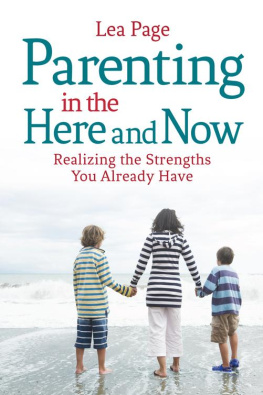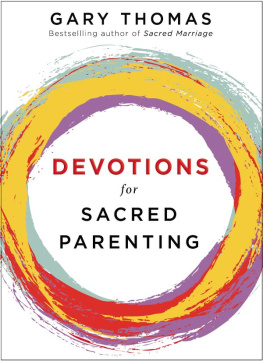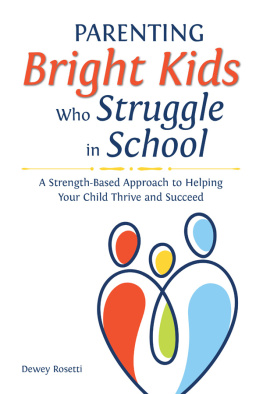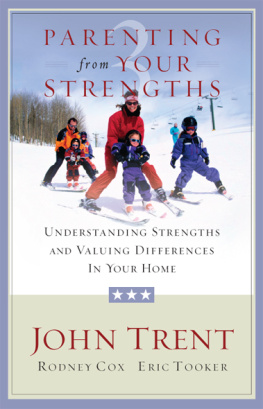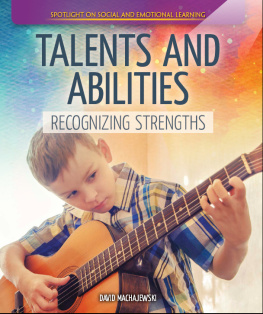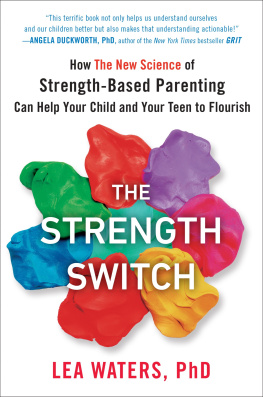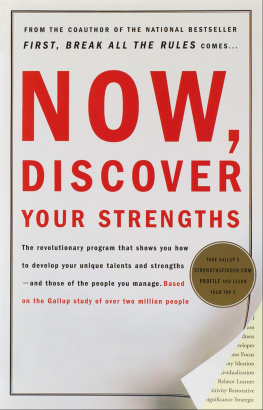IMPORTANT Information About Taking Clifton StrengthsFinder and Clifton Youth StrengthsExplorer
Your e-book retailer will provide you with two unique, one-use-only access codes that are included with this book: one code to take the Clifton StrengthsFinder assessment and one code to take the Clifton Youth StrengthsExplorer assessment. To take the assessments, visit www.strengthsbasedparenting.com. Click the Take assessments button, and follow the instructions. Each access code is valid for one use only.
Introduction
Look at the person sitting to the right of you. And if theres no one on the right, look at the person sitting to the left. That person and you differ at over a million locations in your DNA.
Lee Silver, Ph.D., professor of molecular biology and public policy, Princeton University
When you have your first child, you congratulate yourself on how perfect he is or how he sleeps through the night sooner than other babies. Or, you wonder what mistakes youve made because you have a fidgety, fussy baby you wouldnt consider taking to a restaurant or on a long car ride. You either pat yourself on the back or wonder what youre doing wrong.
My first child was that squirmy, high-strung, fussy baby. Around the same time I had him, my best friend had a baby who was calm and always smiling. My friends baby made parenting look like a piece of cake. I worried about what I needed to do differently, and I was sure I had ruined my first born.
And then came baby number two. I had no idea how easy a baby could be. She was naturally even-tempered and content in a car or at a restaurant, and she took long naps. Once I had my second child, I quickly realized that she was her own person. Her adaptability, calm personality and relaxed style were more about who she was than about how I was parenting her. My first child continued to be wiry and active, and during his first two years, he started exhibiting his competitive nature.
After we added two more children to our family, it became more than clear to me that each child enters this world as a unique individual as most parents will attest. Sure, each one is a composite of his or her parents, but each child is most definitely a unique human being. And this reality leaves all parents to do the only thing they really can do parent their children in the way that best enhances each one. But what makes a difference, and how does it matter?
Scientists know more today than ever before about the biological code of DNA, and as research progresses, they will understand it even more clearly. The DNA letters that are the genetic code to each person A, T, G, C combine in thousands of ways. The combinations are vast and complex, and the constellations that come together are never exactly the same. That is why we are all unique.
Individuals are prewired, but decades of research show that environment also plays a role in development. Studies of identical twins who were raised in different families give insight into the effect of nature and nurture. Who people are and what they become is an inextricably linked outcome of both genetic and environmental influences. Nurture and nature interact to make individuals who they are.
As a parent, you can encourage your children in hundreds of ways, and there are hundreds of things for you to worry and wonder about. Yet even in the midst of your busy and complex daily schedule, you have the opportunity to focus on your children in a way that will have a lasting and positive impact on their lives. You can appreciate their individuality. You can help them see and know their natural affinities their talents that can become strengths. You can help them explore their interests. And you can build your life and their lives on what will help them become productive, happy people.
The miracle of individuality
During my first year of teaching, I was also working to complete a masters degree in educational psychology. It kept me up late at night, but what kept me up even later was trying to unlock the key to each student to help him or her learn. As part of my thesis, I studied students with learning disabilities. Thats how I met Steve, a fourth-grade student who quickly validated what I innately knew.
Steve did what he was supposed to do and didnt cause problems in the classroom or at home. His teacher told me that he struggled with math and reading. His mother explained that he had been tested quite a bit and that all of his deficits had been identified. When I interviewed Steve, he confirmed everything I already knew from his teacher and his mom. Steves identity and activities were wrapped up in what were considered his inadequacies.
For my study, the assessment I used was a one-on-one interview with open-ended questions designed to identify strengths and interests. When I would ask parents and other teachers for permission to interview children, most were excited and happy to help. But Steves mom said, Well, we already know whats wrong with him, and we have had lots of tests. His teacher also responded by saying she already knew what was wrong and was working on it he had issues with math, reading and social skills. And it was clear that connecting with Steve was challenging.
My first interview with Steve was painful for me. I asked him questions, and after lengthy and awkward pauses, he responded with short answers. Toward the end of the interview, I said to him, Tell me what you like to do in your free time. He responded that he didnt have friends to hang out with and that he mostly just watched TV.
And then just before I moved to the next question, something sparked him to add, Theres this one show I like where the guy shows you how to draw. I watch it and draw whenever its on. I had promised Steves mom and teacher some feedback, but he didnt give me much to work with. Grasping at straws, as we concluded, I told Steve that Id love to see his drawings sometime.
Monday morning rolled around, and as I sat at my desk getting ready for classes to start, I heard some shuffling. I looked up and saw Steve. He simply dropped some papers on my desk. The papers had his sketches on them. And each day, he returned with more drawings. We quickly became friends. That someone simply cared, listened, accepted and appreciated something he could do not all the problems that overwhelmed him was powerful. It changed Steve. By the time he was in fifth grade, he had become a kid who liked school, who improved in math and reading, and who made three new friends.
This doesnt sound like a miraculous story, and yet it is. Steve isnt some wonder kid who went on to become famous, but he is a kid who grew from who he was instead of who he wasnt. And in that sense, he is the miracle that each of us should be.
This story could be true for thousands of kids kids who should be defined by what they can do and who they can become versus who they arent. For Steve, that meant someone appreciating who he was beyond math, reading and relating.
As a result, the significant adults in Steves life saw him through a new lens. They started to display Steves art. He drew a lot of cartoons and had a sense of humor that other kids could relate to. When youre at that age, drawing and cartooning are revered talents. They gave Steve a new identity. Instead of being the kid who couldnt read or write well or who didnt know math, he became known as the funny kid who could draw.



